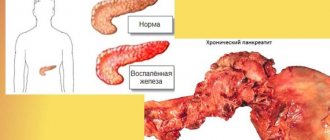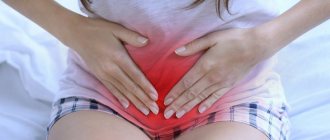Food poisoning
All people have had to deal with this disease, and, as a rule, unpleasant symptoms disappear within a few hours or days. It all starts with the fact that a person has a stomach ache and also begins to feel nauseous. Abnormal bowel movements may be present, manifesting as diarrhea. Vomiting may also occur, after which in most cases relief comes.
In general, the patient experiences weakness, dizziness, and muscle aches. You shouldn’t be surprised that your head and stomach hurt, because this is quite a common occurrence. It is extremely important to take timely measures to quickly improve a person’s well-being. It is recommended to use products such as activated carbon, Polysorb, Sorbex. They effectively remove toxic substances from the body and immediately relieve unpleasant symptoms.
Sometimes gastric lavage helps if there is severe vomiting. You may also need medications to stop the diarrhea. As a rule, when a person suffers from food poisoning, they quickly get better. If this does not happen within several hours, the right decision would be to call an ambulance. Some foods, such as wild mushrooms, can lead to serious consequences. Don't hesitate and wait for the situation to get worse.
Head pain, stomach pain and nausea
If a person has a headache, a stomach ache, and at the same time feels nauseous, then the combination of such symptoms, as a rule, may indicate the development of a serious illness. The reasons may vary. But more often such symptoms accompany the following pathological conditions:
- gastritis;
- appendicitis;
- toxic infection;
- stomach flu (rotovirus infection);
- food poisoning.
Inflammation of the gastric mucosa is called gastritis. The disease can occur in acute and chronic format, but in both cases the patient develops characteristic symptoms:
- stomach pain appears;
- attacks of nausea and vomiting;
- feeling of heaviness in the epigastric region.
Signs of gastritis can either intensify or disappear completely. The current clinical picture largely depends on the stage of the disease. Thus, attacks of nausea develop with gastritis with low acidity. Its development can be provoked by drinking alcohol, certain medications and smoking.
The patient feels pain of a paroxysmal nature, and in the intervals between them - significant discomfort in the epigastric area. Nausea with gastritis occurs after eating, which is caused by the reflux of a food coma from the lumen of the small intestine into the stomach.
Headaches accompanied by heaviness in the stomach and discomfort in the intestines require contacting a specialist for qualified advice. During an exacerbation of gastritis, the stomach may hurt for several days. Throughout the entire period, the patient develops paroxysmal pain, which becomes stronger after eating.
Additional signs of gastritis are:
- increased formation of saliva;
- headache;
- tachycardia;
- attacks of nausea;
- heartburn;
- belching.
Appendicitis
This reason is also quite common, and because of it, the stomach and head often hurt. An inflammatory process occurs in the appendix, and the symptoms of this pathology cannot be ignored. When the disease becomes acute, a person begins to suffer from significant pain. It can get to the point where you can’t straighten up, much less walk.
Possible increased body temperature, significant gas formation and diarrhea. The person begins to feel very nauseous, which makes it impossible to hold back the vomit. Pain is often observed on the right side under the liver, as well as in the navel area. It is recommended to go to the hospital immediately, because acute appendicitis is treated with surgery. Before doctors arrive, you should not take any medications, because this will blur the overall clinical picture.
If a child is sick
The reasons why a child may have a headache and stomach ache are the same as in an adult. However, we must remember that symptoms such as indigestion, weakness and high fever in children can be very dangerous. Due to the fact that the baby’s body is still weak, it is more susceptible to intoxication and dehydration than an adult. Therefore, self-medication in such situations can be very dangerous.
In some children, abdominal discomfort and headaches are signs of psychological problems. This could be trouble or increased workload on the child at school or lack of parental attention. If your child has just such a situation, show him to a child psychologist who will help him understand the problem and tell him how to cope with it.
Your stomach and head may hurt after taking certain medications. Therefore, you cannot prescribe them to your baby yourself. All medications and vitamin complexes must be prescribed by a doctor.
Rotovirus infection
Stomach flu is not uncommon and occurs predominantly in children. It is caused by infectious pathogens that provoke the development of the disease. The symptoms are quite similar to ordinary poisoning. There will be a stomach ache, stool upset, and vomiting.
The pain itself is sharp, and due to intoxication of the body, it is observed not only in the abdomen, but also in the head. Quite often the body temperature appears, the person suffers from chills, and the whites of the eyes may turn red. Often the infection enters the body due to unwashed hands, dirty water, and undercooked meat.
Various drugs are used for treatment, for example, Smecta, Polysorb, activated carbon. To maintain water balance, you can use Regidron. When a person feels better, it will be useful to use Linex. If a person does not feel better within a day, then it is imperative to consult a doctor to prevent serious complications.
Toxic infection is one of the causes of headaches and stomach pain
A person can recover only after a day; some people still have weakness for a long time. The disease is difficult to tolerate if a person is poisoned by toxic clostridia. First, severe pain appears in the abdomen, it is localized in the navel, then it becomes dark before the eyes, and profuse vomiting appears. A person has frequent stools, with a liquid consistency, and suffers from dehydration.
When a person is poisoned by food products that contain a large amount of toxins caused by botulism - meat, fish, mushrooms, vegetables, canned food, in addition to pain in the abdominal area, severe vomiting is disturbing, the stool becomes liquid, then the muscles weaken, vision decreases, the eyelids droop, the person has a hard time swallow food.
In this situation, it is important to take action in time, because death can occur due to botulism due to the fact that the respiratory system is paralyzed.
Particularly dangerous are the pains caused by meningitis, when the body temperature rises high, vomiting appears, the patient feels very bad, he cannot straighten his legs and bend over.
Often pain in the stomach and head is caused by arterial hypertension; this often happens if a person has experienced stress.
Due to the fact that a woman’s blood composition changes dramatically, it accumulates in large quantities in the pelvis, legs, and the brain does not have enough of it. In this situation, you need to lie horizontally or on your side. When carrying a child, it is important to monitor your diet and drink as much purified water as possible. If after rest a woman does not feel relief, her stool is very liquid, she should consult her doctor.
The incubation period of the disease ranges from one to five days. Recovery occurs 4-7 days after the onset of the disease. The infection is gradually eliminated from the body along with feces.
The main symptoms of poisoning are:
- Severe sharp pain in the abdomen
- Intense pain in the gastrointestinal tract, possible attacks or even convulsions
- Mild “background” headache
- General muscle weakness
- Fever
- Chills
- Darkening in the eyes
- Diarrhea
- Nausea and vomiting
Since diarrhea and vomiting also remove the necessary salt solutions - electrolytes - from the body, drugs such as Regidron and Hydrovit are used to treat poisoning. Their solutions, which also need to be drunk in small sips throughout the day, help restore the normal acid-base balance of the body, and therefore cope with general malaise.
Headache and stomach ache are other causes of food poisoning
Nausea, vomiting, headache and abdominal pain are common symptoms of nervous diseases, as well as the development of tumor diseases of the brain. In the latter case, all these symptoms are regular, and over time they only intensify. In the morning, the patient may feel worse as the disease worsens. A common factor is a slight increase in body temperature - up to 38 degrees.
Meningitis is a very insidious disease in which a person can have a severe headache. Attacks of nausea or vomiting are also very common with meningitis. This has nothing to do with diseases of the gastrointestinal tract. A characteristic symptom of meningitis is a significant increase in pain when tilting the head or straightening the legs at the knees. The patient's condition may deteriorate significantly at once.
Nausea and headache occur when blood pressure rises. All hypertensive patients are familiar with these symptoms. As a result of severe nervous strain or stress, a person may experience a condition known as a hypertensive crisis, when a sudden sudden rise in blood pressure leads to severe headache, nausea, darkening of the eyes, and even loss of consciousness.
Abdominal pain accompanied by headaches often occurs in women during menstruation. This condition does not require any special treatment; it does not threaten health. But if your pain is too intense, you can consult your gynecologist.
- daily urine volume decreases;
- lower back pain;
- fatigue, weakness;
- swelling of the face, eyelids, internal organs;
- fever;
- constant thirst; convulsions.
Interesting: Symptoms, treatment features and consequences of TBI in a child
If the disease is not treated, the inflammatory process progresses and kidney failure develops. To protect the child from the consequences, at the first manifestations of the disease, the child is shown to the doctor.
In most cases there is nothing to worry about and your doctor will reassure you of this. Abdominal pain during pregnancy is not always a harbinger of trouble.
Stretching of the muscles of the ligaments surrounding the uterus, as it grows, is also manifested by mild pain in the lower abdomen, which is especially felt with sudden movements. The ligaments begin to stretch, which is accompanied by pain, and this is quite natural, such pain can be aching, most often it goes away after some time on its own, without the use of painkillers.
A pregnant woman's stomach can hurt for a very common reason - due to indigestion. Such pain in most cases appears due to disturbances in the functioning of the stomach. Many pregnant women are quite sophisticated in their taste preferences; they, of course, eat a lot and often, sometimes completely incompatible foods. It is best to follow a diet during a diet and not try to eat everything your heart desires.
The pancreas may begin to hurt during pregnancy due to non-compliance with the diet; a large amount of meat and fatty foods makes itself felt; in addition, if a woman smokes or drinks alcohol, then she should immediately run to the doctor. After all, such violations can cause irreparable harm to the baby.
Pain in the upper abdomen can also be caused by the active growth of the uterus, which puts pressure on the gallbladder and liver, which disrupts the process of bile secretion. This is what causes pain.
You may also feel a little nauseous in the first months of pregnancy, and white discharge may appear. The main thing is that at this time a woman should pay attention to both the nature of the pain and the color of the discharge. If the pain is too intense and the discharge is brownish in color, then this indicates possible pathologies and disorders.
If a woman is in an interesting situation and has a stomach and headache, then immediately go to the doctor, it is better to seek the advice of a specialist and be completely calm that everything is normal. A gynecologist knows the condition of your body, the details of fetal development, is familiar with the clinical picture, and after an examination he will be able to tell you how serious this problem is.
However, it is possible that the cause is more serious, for example, such a symptom appears in pregnant women when placental abruption occurs; only in some cases, with timely diagnosis, can the child be saved, but in most cases a miscarriage occurs. Due to the rupture of blood vessels during placental abruption, bleeding develops into the uterine cavity.
The woman is in severe pain. This is dangerous and requires urgent medical attention. Most often this occurs starting from the 8th week of pregnancy. Causes may include, for example, smoking, drinking alcohol, taking aspirin, or high blood pressure. Accidents and frequent travel (shaking) can also cause detachment.
Ectopic pregnancy. When the uterine rupture occurs, internal bleeding develops, the symptoms of which are severe pain, dizziness, general weakness, and possible loss of consciousness. If such symptoms appear, call an ambulance immediately. Remember that with internal bleeding there may be no bloody discharge at all, which does not make it any less dangerous.
Threat of spontaneous abortion. In this case, bleeding (or spotting) is mandatory. Other symptoms: aching pain in the lower abdomen, radiating to the lower back. Hospitalization is necessary, otherwise it is unlikely that it will be possible to maintain the pregnancy.
Non-obstetric causes of pain during pregnancy
For many people, headaches, like abdominal pain, are commonplace. Some do not even consider this a problem, but perceive these symptoms as a given and limit themselves only to taking antispasmodic or painkillers.
However, sometimes the head and stomach hurt at the same time. In this case, you should not delay visiting a specialist and immediately consult a doctor. After all, these are the symptoms that are characteristic of some infectious diseases.
Insidious rotavirus
Infectious diseases caused by rotaviruses are characterized by an acute onset. A person affected by rotavirus feels severe pain in the abdominal area, which subsequently develops into headaches caused by intoxication of the body. It is worth noting that the order of appearance
pain may be reversed. Sometimes such pain can be accompanied by nausea.
Rotaviruses are transmitted in completely different ways. The virus survives well at low temperatures. Children are most susceptible to the effects of rotaviruses, because this infection is classified as a disease of dirty hands. But adults are also at risk, because poorly washed vegetables that carry the virus, and even a simple conversation with a person carrying rotavirus virions, can be dangerous. However, the overwhelming majority of diseases are registered in patients under 5 years of age, from November to April.
Rotavirus infections lead to gastrointestinal diseases, which is why the infection is also known as intestinal flu. Stomach flu can cause fever, severe nausea, headaches, weakness and inflammation of the tissues of the mouth. A very small percentage of diseases were fatal.
Pain can also be caused by other diseases. If you consume expired food products, dangerous medications, or simply oversaturate your body with harmful substances, there is a risk of poisoning. Most often, poisoning is caused by the Salmonella bacteria entering the body.
Pregnancy period
During pregnancy, a woman may often feel nauseous and have a headache. These symptoms are not considered dangerous, and they are especially noticeable in the morning. Sometimes there may be a tugging in the lower abdomen; a similar symptom is characteristic of the initial stage of pregnancy. In some cases, unpleasant symptoms occur late in life, and gradually the symptoms go away.
It should be understood that if you experience intense pain, you should definitely consult a doctor. It is quite possible that they signal some abnormalities in the body. You definitely need to be examined by a doctor, because not only the woman’s health, but also the life of the unborn child depends on this. You may need to perform an ultrasound of the pelvis and esophagus, as well as a general blood test. You will need to visit a gynecologist, he will be the one who will decide on further treatment.
Headache in women
Most women in the period before the onset of menstruation experience dizziness, pulling in the lower abdomen and may feel nauseous. Therefore, headaches and other unpleasant sensations are considered to be manifestations of premenstrual syndrome.
Women subject to constant stress and depression often begin to eat away at their troubles, which can also cause discomfort in the gastrointestinal tract and headaches. In such cases, they need to rest more and learn to get rid of nervous tension. It's a good idea to play sports and walk more in the fresh air.
High blood pressure
Hypertension is predominantly experienced by older people, while the pathology can also be observed in young people. Often an attack is provoked by stressful situations, problems with blood vessels, as well as other unfavorable factors. If high blood pressure occurs, then various symptoms are often observed.
Signs:
- Painful sensations in the head area.
- Nausea and vomiting.
- Spasms in the gastrointestinal tract.
- Numbness of the limbs.
- Panic attacks.
- Nervousness.
- Sleep problems.
- Feeling of heaviness in the forehead and temples.
- Darkening in the eyes.
If a person suffers from hypertension, then he will definitely need to control his blood pressure. In the event of an increase, immediate action must be taken. You will need to take medicine that helps normalize your blood pressure. It is also worth finding out the reasons why the pathology appeared.
If possible, it is worthwhile to prevent attacks. In particular, you need to exercise, monitor your weight, and give up bad habits. It will be useful to balance your diet to improve the condition of the body. If blood pressure rises, then it is imperative to bring it down.
Toxic infection
Bacterial toxins can be the reason why a person has a headache, a stomach ache, and at the same time feels sick. The causative agents can be: Staphylococcus aureus, Bacillus cereus bacteria, clostridia, botulism bacteria.
After the pathogen enters the body, a person develops certain pathological symptoms.
This is pain in the abdomen and epigastric region, nausea ending in severe vomiting, a drop in blood pressure - the patient becomes dizzy, the limbs become cold, and the vision darkens.
Staphylococcal toxicoinfection, despite severe symptoms, is characterized by rapid recovery. Stabilization of the condition occurs approximately 3 days after the appearance of the first symptoms of the disease. But weakness and dizziness may persist for another two to three days.
Clostridia poisoning is much more severe. The onset of the pathology is accompanied by bloating and severe abdominal pain, localized in the projection of the small intestine - the peri-umbilical region. Later, other symptoms appear: darkening before the eyes, nausea, uncontrollable vomiting, severe diarrhea (up to 20 times a day). All this causes dehydration of the body.
You can become infected with botulism bacteria by eating low-quality foods. Most often this is meat, fish and home-canned mushrooms and vegetables. Symptoms of botulinum toxin infection include:
- severe abdominal pain;
- indomitable vomiting that does not bring relief;
- repeated diarrhea.
If left untreated, they are accompanied by muscle weakness, drooping of the eyelid and paralysis of the respiratory tract, which leads to death. First medical aid consists of gastric lavage, taking sorbents and rehydrants.
Head injury
Headache and stomach pain may be due to a concussion. In such a situation, you cannot neglect the pathology and not consult a doctor. Of course, a mild concussion can go away on its own and not lead to complications. If the pathology is serious, then the person’s well-being will worsen. In some cases, swelling of the brain occurs, as well as hydrocephalus. An inflammatory process in the cranial cavity may also begin.
If after an injury a person begins to feel sick, there is weakness in the body, and there is dizziness, then you should be diagnosed by a doctor. Moreover, you need to go to the hospital when there was loss of consciousness. These symptoms are not accompanied by an increase in body temperature, and the person may break into a cold sweat.
Treatment depends on how serious the pathology has become. Analgin, Pentalgin or Baralgin are used to relieve discomfort. Sedatives may be needed to calm the nervous system. For example, valerian and motherwort are used. In more advanced situations, tranquilizers are prescribed: Phenazepam, Rutodel and Elenium. The course of admission is on average 5 days.
During the rehabilitation period, a person may be prescribed Cavinton and Teonicol. It is extremely important to monitor changes in the condition so that, if necessary, action can be taken in time. If the patient’s well-being worsens, then the course of treatment will need to be reconsidered.
Treatment methods
Poisoning may be caused by poor quality or poorly washed food.
Food poisoning can be treated at home, except in cases where bacteria such as salmonella and botulism are ingested. This requires an integrated approach: antibiotics, drips for rapid detoxification. If gastric lavage does not help and the condition worsens, you must call an ambulance.
Severe infectious diseases, such as meningitis, are treated in a hospital setting. The percentage of deaths is high if a person does not receive help on time. Antibiotics are prescribed, as well as drugs to strengthen the immune system and maintain the nervous system. Depending on the type of infection and the patient’s condition, treatment is selected individually.
Surgical methods are used when access to the abdominal cavity is necessary - appendicitis, peritonitis. After surgery, antibiotics are used to suppress infection, painkillers and anti-inflammatory drugs. The diet is indicated for 2 - 3 weeks, after which you can gradually switch to regular food.
Traditional methods of treatment can be used as general strengthening measures, but in most cases they delay the moment of recovery and can even lead to the death of a person. We must not forget that the immune system of modern people is not so strong and is not able to cope with infections on its own.
Other reasons
There are a number of other reasons that lead to the appearance of a negative symptom. Only a doctor can definitely say what pathology you have encountered. It will be useful to consider an additional number of reasons that lead to unpleasant symptoms.
Other pathologies:
- Meningitis. In this case, inflammation of the brain occurs, which is necessarily accompanied by an increase in body temperature, nausea, and vomiting. Professional treatment is definitely needed, because the disease can even lead to death.
- Malignant neoplasm. It can also cause a person to have a headache, as well as nausea and even vomiting. Mostly symptoms appear in the morning. They are not associated with external factors, so a person may not understand why he has these manifestations.
- Poisoning with toxic substances. It is much more dangerous than an eating disorder. If treatment is not started in a timely manner, then the consequences can be very unfavorable. In general, the symptoms resemble ordinary poisoning, but the cause of the pathology differs.
In some cases, a person may even have a headache and stomach ache due to hunger, so you should not always worry about the appearance of an illness. At the same time, it is extremely important not to trigger pathologies and observe changes in well-being. If it gets worse, then you will need to go to the hospital. You should not wait until a person becomes really ill. The sooner you start treatment, the greater the chances of avoiding complications, as well as quickly improving your health.
How to distinguish appendicitis from other diseases
The painful symptoms in question may indicate developing diseases. Dizziness and stomach pain can occur due to various ailments. The most common is appendicitis.
It is very important to diagnose the disease in time and not to confuse it with other pathologies, during which dizziness, nausea, and stomach pain are felt. This is due to the fact that with its rapid development, the cecum can break through and all its contents will be released into the abdominal cavity. As a result, blood poisoning and sudden death of the patient may occur.
To prevent this from happening, you should take a closer look at the signs of the disease:
- The patient feels that his stomach hurts, but cannot explain where exactly. That is, the pain seems to spread inside the abdominal cavity.
- If no measures are taken at the first stage, then the unpleasant sensations shift - pulling in the lower abdomen on the right side. The pain gradually intensifies.
- Body temperature rises.
- With an increase in the amount of purulent substance in the cecum, the pain becomes unbearable, acute, and very difficult to endure.
- Bloating and dizziness in almost all cases of appendicitis does not occur without vomiting.
- Light physical activity or natural physiological processes, such as sneezing, lead to a worsening of the condition, causing even more dizziness and stomach pain.
- The abdominal area is elastic, the muscles are very tense.
- The patient is severely weakened, moves with difficulty, the slightest effort leads to the formation of perspiration.
Important! If these symptoms are detected, you must immediately call an ambulance! Appendicitis can be dangerous to life and health!
Please note that in some people the appendix is not located on the right side. Therefore, even if the pain is localized in the left side of the abdomen, you should not let the situation take its course and hope that everything will go away by itself.
Diseases
A disease in the body can simultaneously cause an attack of headache and abdominal pain.
Infection of the body is manifested by gastrointestinal cramps, then a headache. According to medical statistics, rotavirus infection affects adults; pediatric cases were recorded only in babies in the first year of life.
Contained in food. Once in the body, it penetrates the gastrointestinal tract, where it causes an unpleasant symptom and is excreted naturally through bowel movements.
Symptoms of rotavirus infection:
- Weakness and malaise;
- Headache;
- Painful sensations in the stomach;
- High temperature exceeding the permissible threshold of 38 degrees;
- Nausea, vomiting and diarrhea.
External signs of infection: the sclera of the eyes turn red, the throat and pharynx become inflamed. The incubation period of the disease lasts no more than 5 days. It is eliminated from the body a week after the first symptoms appear.
An inflammatory process in the gastric mucosa, occurring in acute and chronic forms. The disease manifests itself as pain in the epigastrium after eating.
The affected stomach is characterized by the following symptoms:
- Constant attacks of nausea;
- Pain is observed in the gastric region and on the left side as the organ is stretched;
- Heavy secretion of saliva;
- Heartburn, belching with a sour taste.
The inflamed appendage of the cecum can radiate to any part of the body. The problem is solved by surgical removal of the organ. Symptoms felt by the patient: pain on the right side, lower abdomen, diarrhea, fever.
Then nausea, vomiting and pain appear at the location of the inflamed appendix. Patients characterize the unpleasant symptoms as bursting, pulling, spreading throughout the entire body and gradually converging to the lower right corner.











